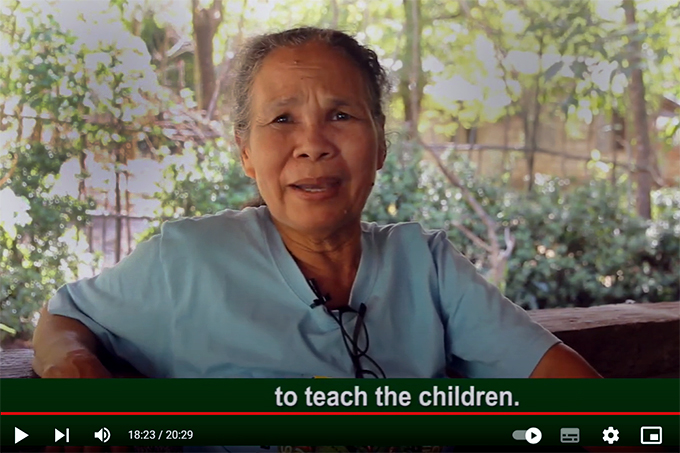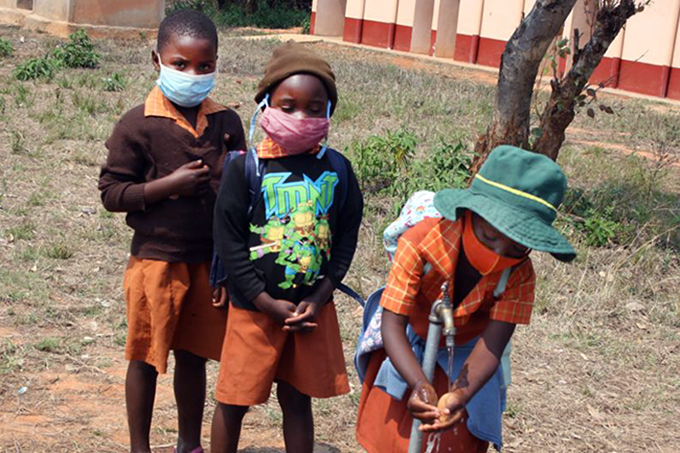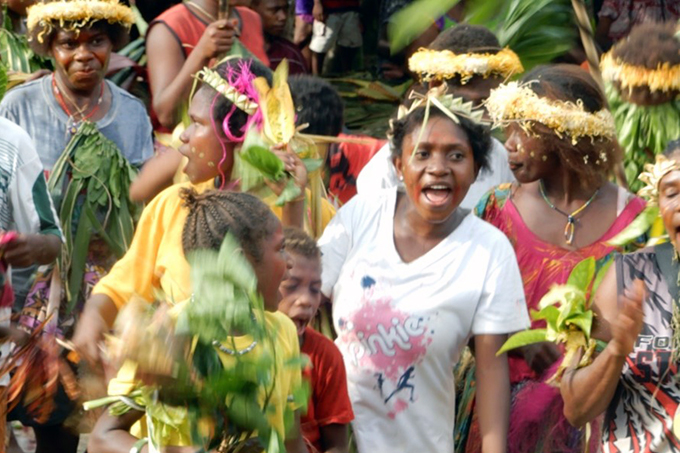Addressing gender barriers in education
Resources
- In the brief on gender-responsive education sector planning from GPE you can read more about the Guidance for Developing Gender-Responsive Education Sector Plans (GRESP) developed by the UN Girls’ Education Initiative (UNGEI) and the Global Partnership for Education (GPE).
- The Gender in Education Network in Asia-Pacific (GENIA) toolkit is a toolkit designed to be used by gender focal points and education planners and implementers in the Asia-Pacific region.
- The toolkit developed by VVOB and FAWE on gender-responsive pedagogy for early childhood education can be used to support early education practitioners in their daily practice.
- Read more about the work for girls’ education undertaken by the organizations funded by Education Out Loud in the Status Reports.
As a result of increasing priority around gender parity in education, there has been significant progress in the enrollment of girls in school over the last 25 years. However, despite numerous initiatives to promote gender parity, only 49% of countries have achieved this in primary education, and as we move up levels of education, the gender gap widens; at the secondary education level, only 42% of countries in the world have reached gender parity in enrollment. At the upper secondary level this number sharply decreases to only 24%. 129 million girls were still out of school in 2018 – a number amplified during the Covid-19 pandemic where up to 11 million girls are estimated to never return. It is clear that the work for gender equality in education is far from over.
Barriers to access and continue education
There are many barriers for girls’ education. Issues such as gender-based violence, early or forced marriage, or teenage pregnancy are some of the issues posing significant barriers for girls in accessing education. Many of the organizations supported by Education Out Loud are working to address these exact issues.
The national education coalition in Tanzania, TEN/MET, has focused advocacy efforts on pushing for a new re-entry policy into education for teenage mothers in the country. This put an end to the ban that had for five years prohibited pregnant girls from returning to school in Tanzania. In the Sahel region, Girls Not Brides addresses the links between early and child marriage and education as part of its Education Out Loud funded project. Girls Not Brides interestingly finds that more girls drop out of school and then get married rather than dropping out of school to get married underlining the importance of retention. In Bolivia, the national education coalition has taken up the battle against the taboo of sexual education to address problems of early pregnancy and domestic violence which are significant barriers for girls to continue their education in the country.
Early pregnancy and marriage, and gender-based violence are only some of the many barriers facing girls. The national education coalition in Ghana (GNECC), supported by Education Out Loud, has for example worked extensively to address the normative barriers impeding girls’ access to continued quality education:
“Teaching and learning materials and resources are heavily biased. They carry a lot of social norms and expectations of girls and boys respectively. In the curriculum, we are depicting pictures where professionals like politicians, lawyers, and managers, are very dominantly male. If you then look at people who perform caregiving roles, school materials strongly depict females performing domesticated roles. The message is recycled and reinforced to the point where girls begin to see themselves in this light and reinforce the limitations that society has put on them,” noted Dinah Adiko, Gender and Inclusion specialist, and Technical Committee member of GNECC, in an article previously published on the Education Out Loud website as an explanation to the persisting gender gap at higher levels of education in Ghana.
The work of these organizations underlines that gender parity in enrollment is only the first issue to consider. Without addressing the barriers negatively affecting retention and girls’ access to continued quality education, girls will continue to face disadvantages and be prevented from providing the immensely positive impacts that educated girls can have on the development of communities and countries.
Beyond the importance of education for the individual’s life and future, a girl’s level of education in fact has immense impacts beyond herself. Data from Global Partnership for Education (GPE) shows that for every additional year of schooling girls receive, their country’s resilience to climate disasters improves because the impact of one girl’s education cascades into her family and community. Girls’ higher lifetime earnings, as a result of education is also a key factor in raising countries and communities out of poverty.
Formal access to education is not enough
The Covid-19 pandemic underlined once and for all that retention of girls in education is just as important as enrollment. Formal access to education for girls is not enough without subsequently addressing the barriers for girls in continuing their education beyond primary-school level.
In the Philippines, the national education coalition, E-NET, has worked relentlessly for better practices on girls’ education. Despite progress on paper, there is a large gap between theory and practice when it comes to girls’ education in the Philippines. This is what E-NET aims to address.
“Raising awareness on gender equality in education among the school administrators, curriculum developers and writers, teaching and non-teaching personnel, parents and students, and involving them in identifying actions on how to realize it, are important steps in gender mainstreaming,” says a representative of E-NET in an interview for the Manila Bulletin.
This is also the experience of the national education coalition in Niger, ASO-EPT. The coalition has been implementing the “Priority to Equality” project since 2021. As part of the project, the coalition facilitated communication sessions for behavior change through 11 community radios, television, and national radio (ORTN) for the enrolment and retention of girls in the contexts of insecurity and the Covid-19 pandemic. By coordinating advocacy sessions for community leaders and local government officials, the coalition wants to encourage these actors to assume their responsibilities in the schooling and retention of girls.
As a UNESCO report indicates, involving boys and men in challenging gender norms in school has a major impact in changing the attitudes and behaviors of students as well as the surrounding school communities. In the experience of the coalitions in the Philippines and Niger, involving not only girls but stakeholders at all levels is key in ensuring continued, quality education for girls.
Gender as a cross-cutting consideration
With the impacts of the Covid-19 pandemic on girls’ school enrollment and return, now is an opportune time to intensify efforts on girls’ education. Many of the national education coalitions supported by Education Out Loud are working to uphold the focus on girls’ education in policy-making spheres. From efforts to disaggregate data on males and females in school in the Solomon Islands and Bangladesh to the incorporation of cross-cutting gender strategies in activities in Burkina Faso and Benin, the coalitions play a key role in facilitating the push from civil society to ensure that gender remains central on the agendas of all stakeholders working on education.
For HOPE Liberia, implementing the EducateHER project funded by Education Out Loud, upholding the focus on gender in education has meant the establishment of a platform dedicated to share data on girls’ education:
“There is no real concentrated effort on data collection specifically for girls’ education in Liberia. How can citizens act if they don’t have information? How do school boards become receptive? How do policymakers ensure that the right policies are being implemented and the right programmes developed?” asks Aisha Cooper Bruce, Executive Director of HOPE Liberia and coordinator of the EducateHER project, in an article previously published on the Education Out Loud website.
Research continues to highlight the need to treat gender as a cross-cutting theme in all activities related to education. Children with low family income, from rural areas, with a disability, or children who belong to an ethnic or linguistic minority group, face significant disadvantages when it comes to education. These disadvantages are, however, exacerbated for children who also happen to be girls placing them in double or multiple vulnerability and leaving them furthest behind in terms of access to and completion of education. For example, gender plays a significant role in education in emergencies and subsequent displacement. In countries affected by conflict, girls are in fact 2.5 times more likely not to attend school than boys. Looking at this number along with data revealing that children in conflict-affected areas are generally more than twice as likely to be out of school than others, the extreme vulnerability affecting girls in fragile contexts is devastatingly clear.
To uphold the attention to gender in education efforts, single programmes to address barriers for girls’ education are therefore not enough. Gender equality must be a cross-cutting consideration at the core of all policy making and programme development on education.
We must look within to make systemic changes
To really address the barriers that girls are still facing in terms of education, it is therefore necessary to look at the way we ourselves contribute to sustaining the structures impacting girls’ access to quality education. This is an effort that many of the partners funded by Education Out Loud have taken on. The national education coalition in Ethiopia, Basic Education Network in Ethiopia (BEN-E) have, for example, recently carried out analyses to understand women’s participation in the coalition itself while the national education coalition in Burundi, Coalition Pour L’education pour tous BAFASHEBIGE (EPT BAFASHEBIGE), has revised international regulations and its recruitment policies to avoid any discrimination of women within the coalition and its member organizations.
Amongst the organizations supported by Education Out Loud, increasing attention has been given to internal structures and for the national education coalitions in Senegal and Zimbabwe, more women have been assigned leadership roles during 2021.
Gender has long been central to programmes on education. However, to effectively address the underlying structures hindering gender equality in education, simply integrating gender into programmes is not enough. We need to look within and understand our own roles in sustaining the structures posing barriers for girls and start changing them - both in education and beyond. This way, we can continue to fight for girls’ access to continued quality education and experience the immense positive impacts of educated girls on the development and resilience of communities and countries.


